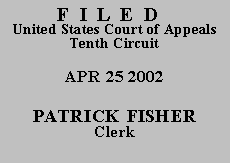

| STAN E. SZCZYGIEL, |
|
In 1981, Mr. Szczygiel pleaded guilty to a charge of kidnaping and was convicted in Kansas state court. In his federal habeas petition, he claims that various aspects of his plea agreement and the sentencing proceeding were constitutionally infirm. The matter was referred to a magistrate judge, who recommended that the petition be dismissed as time-barred under the one-year limitation provision of Antiterrorism and Effective Death Penalty Act of 1996 (AEDPA), 28 U.S.C. § 2244(d). The federal district court adopted the magistrate's recommendation and dismissed the petition.
The AEDPA applies a one-year limitation period from the date of final conviction. 28 U.S.C. § 2244(d). For convictions that became final prior to the enactment of AEDPA, as did Mr. Szczygiel's, the limitation period runs from April 24, 1996. United States v. Simmonds, 111 F.3d 737, 746 (10th Cir. 1997); see also Miller v. Marr, 141 F.3d 976, 977 (10th Cir. 1998). The limitation is tolled during the time that a properly-filed application for state post-conviction relief is pending. 28 U.S.C. § 2244(d)(2).
Mr. Szczygiel filed two motions for post-conviction relief in Kansas state court. The statute of limitations was therefore tolled while each of these motions were pending and until the Kansas Supreme Court denied review for each. After accounting for the tolling, the one-year limitations period expired on or about August 1, 1998. Since Mr. Szczygiel did not file his habeas petition until January 1999, his claim is time-barred.
Mr. Szczygiel argues that, in addition to the two motions taken into account by the district court, he filed a state habeas petition in Butler County, Kansas district court prior to the expiration of the statute of limitations. He claims that the statute of limitations should have been tolled during the time that this petition was pending. When filed, Mr. Szczygiel indicated that the petition was pursuant to Kan. Stat. Ann. § 60-1501. However, the Butler County district court determined that the petition attacked Mr. Szczygiel's sentence and conviction, and that it therefore should have been filed pursuant to Kan. Stat. Ann. § 60-1507. The appropriate forum for a § 60-1507 petition is in the court of conviction, which, in Szczygiel's case, is the Wyandotte County, Kansas district court. The Butler County district court ruled that it lacked jurisdiction over the petition, dismissed the claims, and directed Szczygiel to refile in the appropriate court in Wyandotte County.
Contrary to Szczygiel's argument, the habeas petition was not "properly filed" in Butler County and therefore it cannot be the basis for tolling AEDPA's statute of limitations. 28 U.S.C. § 2244(d)(2). "[A]n application is 'properly filed' when its delivery and acceptance are in compliance with the applicable laws and rules governing filings ... for example ... the court and office in which [the application] must be lodged." Artuz v. Bennett, 531 U.S. 4, 8 (2000) (emphasis in original); Habteselassie v. Novak, 209 F.3d 1208, 1210-11 (10th Cir. 2000). "If, for example, an application is erroneously accepted by the clerk of a court lacking jurisdiction, ... it will be pending, but not properly filed." Artuz, 531 U.S. at 9 (emphasis in original). Mr. Szczygiel filed an application containing claims attacking his sentence and conviction in a court which, under Kansas state law, had no jurisdiction over such claims. Despite pending before that court for some time, it was never properly filed, and therefore does not warrant tolling the statute of limitations.
Mr. Szczygiel cites several reasons that he believes require equitable tolling of the statute of limitations in his case, including the late discovery of certain materials from the prosecution case file, time that he spent in maximum custody confinement, and the withdrawal of his retained counsel. The AEDPA's one-year period of limitation is subject to equitable tolling in extraordinary circumstances. Miller, 141 F.3d at 978. The one-year period may be equitably tolled "when a prisoner is actually innocent, when an adversary's conduct or other uncontrollable circumstances prevents a prisoner from timely filing, or when a prisoner actively pursues judicial remedies but files a defective pleading during the statutory period." Gibson v. Klinger, 232 F.3d 799, 808 (10th Cir. 2000) (citations omitted). We find, as did the district court, that nothing alleged by Mr. Szczygiel amounts to an extraordinary circumstance that warrants equitable tolling.
We DENY a COA and DISMISS the appeal.
Entered for the Court
Paul J. Kelly, Jr.
Circuit Judge
*. This order and judgment is not binding precedent, except under the doctrines of law of the case, res judicata, and collateral estoppel. This court generally disfavors the citation of orders and judgments; nevertheless, an order and judgment may be cited under the terms and conditions of 10th Cir. R. 36.3.
2. After examining the briefs and the appellate record, this three-judge panel has determined unanimously that oral argument would not be of material assistance in the determination of this appeal. See Fed. R. App. P. 34(a); 10th Cir. R. 34.1(G). The cause is therefore ordered submitted without oral argument.